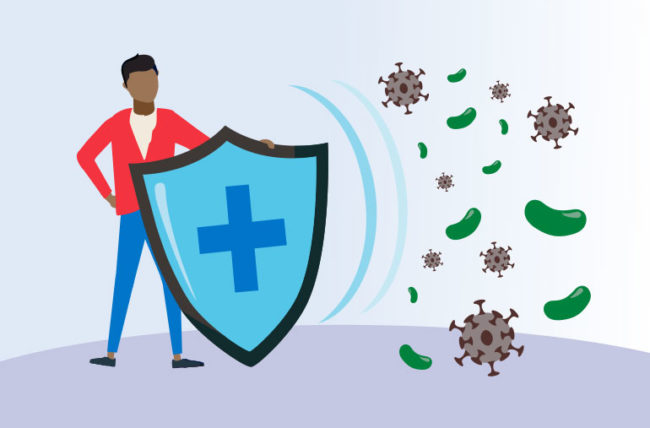
Do you have a neighbor or daughter-in-law taking the latest miracle immunity booster product? In the age of the COVID-19 and with the coming flu season, everyone is looking for ways to protect themselves and their family. Unfortunately, some unscrupulous folks are looking to make a quick profit by promoting products with bogus protective claims. Beware of such claims! The products on supermarket shelves and the internet are not regulated for effectiveness or safety. According to Harvard Health Publishing: “although some preparations have been found to alter some components of immune function, thus far there is no evidence that they bolster immunity to the point where you are better protected against infection and disease.” So what can you do to bolster your immunity? Read on for science-based advice!
The idea of a miracle immunity booster is tempting but not realistic. This is because the immune system is made up of an intricate system of cells, proteins, and organs that work together to prevent or limit infections. There is still much that scientists don’t know about the interconnectedness of the immune response. As of now, they have yet to make scientifically proven direct links between different elements and improved immune function. But that doesn’t mean scientists are not investigating promising lifestyle habits which do seem to have immune system-enhancing results, including the effects of diet, exercise, stress management, and other factors.
So what should you do to give your immune system the best fighting chance? Your first line of defense is a healthy lifestyle. This is not only the best way to keep your immune system strong, but it will also ensure every part of your body functions at its best. Protect your entire body from environmental assaults by not smoking, drinking alcohol in moderation, and maintaining good hygiene by washing your hands frequently. Other lifestyles habits that bolster your immune and whole-body health include:
Exercise Regularly
Physical activity contributes to good health and therefore to a healthy immune system. It promotes good circulation which allows the cells and substances of the immune system to travel through the body freely and do their job effectively. Stuck inside? You can still walk around the house or the neighborhood (if allowed), climb stairs, use canned food as weights; be creative and do what you can.
Eat Nutrient-Rich Foods
These foods include vegetables, fruits, whole grains, nuts, seeds, and legumes. This includes fresh, frozen, canned, dried fruits and veggies- all forms work! These foods contain minerals, antioxidants, phytochemicals (plant chemicals), and other substances that help support healthy body systems, including the immune system. Specifically, vitamin A, C, D, and E; the mineral zinc and other trace minerals may play a role in supporting the immune response. Obtaining these nutrients from foods is preferred, so be sure to speak with your health care provider or a registered dietitian before taking any supplements. Taking megadoses of any vitamin or mineral can be dangerous – more is not better.
Eat Foods that Contain Probiotics and Prebiotics
Doing this this helps promote gut health and immunity. Probiotics are “good” bacteria that promote health. They can be found in cultured dairy products like yogurt and kefir; and fermented foods like tempeh, kimchi, and kombucha. Prebiotics are specialized plant fibers. They act like fertilizers that stimulate the growth of healthy bacteria in the gut. Good sources include asparagus, yams, berries, onions, and many more.
Power up with Protein
Include protein with all your meals and snacks. Protein is important for a strong immune system, especially for healing and recovery. Eat a variety of protein foods including seafood, lean meat, poultry, eggs, beans and peas, soy products, low-fat dairy foods, and nuts and seeds.
Manage Stress
Stress comes in many forms, durations, and intensity. This makes it difficult for researchers to pinpoint their effect on the immune system. However, sustained stress does have a negative effect. Find ways to cope with stress such as meditation, prayer, exercise, listening to music, writing, or talking to friends. Let’s face it, stress is all around and we could all use a coping mechanism. Find one that works for you.
Get Enough ZZZ’s
Lack of sleep contributes to a variety of health concerns including a weakened immune system. Your immune system works much more efficiently when you are rested because beneficial resetting and functioning happen when you are sleeping. Research shows that people who are chronic poor sleepers have increased inflammation markers.
Get a Flu Shot
Of course one of the best protections against the seasonal flu is to get vaccinated and according to the CDC: “Getting a flu vaccine during 2020-2021 is more important than ever because of the ongoing COVID-19 pandemic. Flu vaccination is especially important for adults 65 years and older, who account for most hospitalizations and deaths from flu and COVID-19.”
Brigitte Harton is a consultant Registered Dietitian at Age Well and a Board Certified Wellness Coach. Have more nutrition or wellness questions? Contact Age Well at 800-642-5119.
Related Articles & Free Subscription

52 Simple Ways to Be Healthier
Better Choices for Surprisingly Unhealthy Foods






Comment here